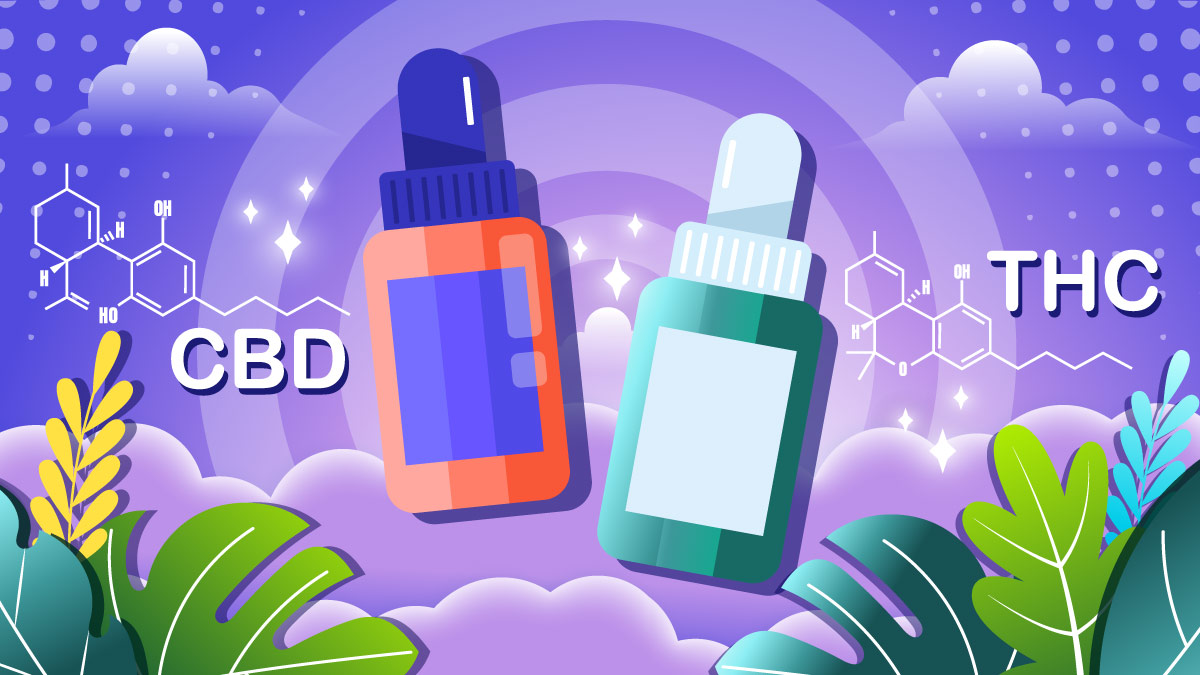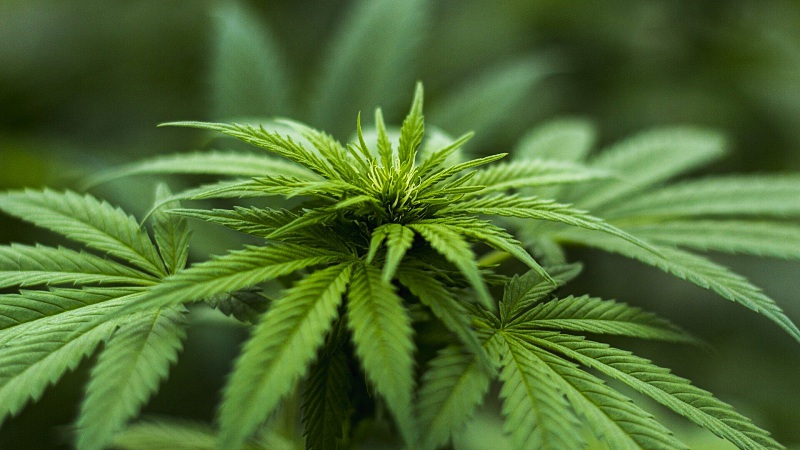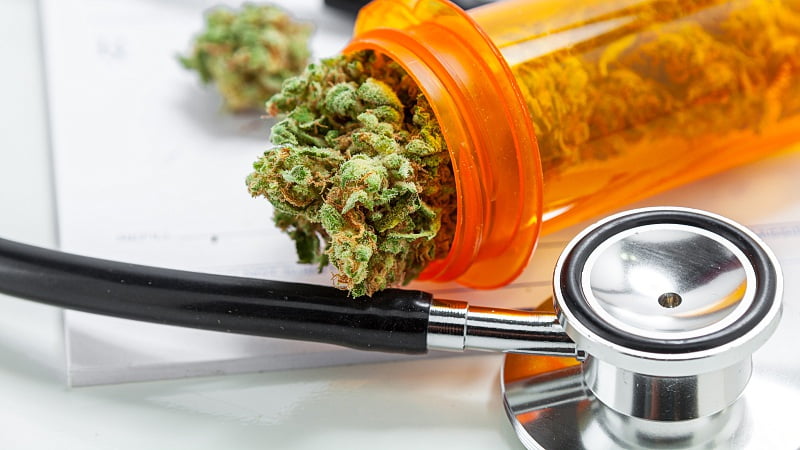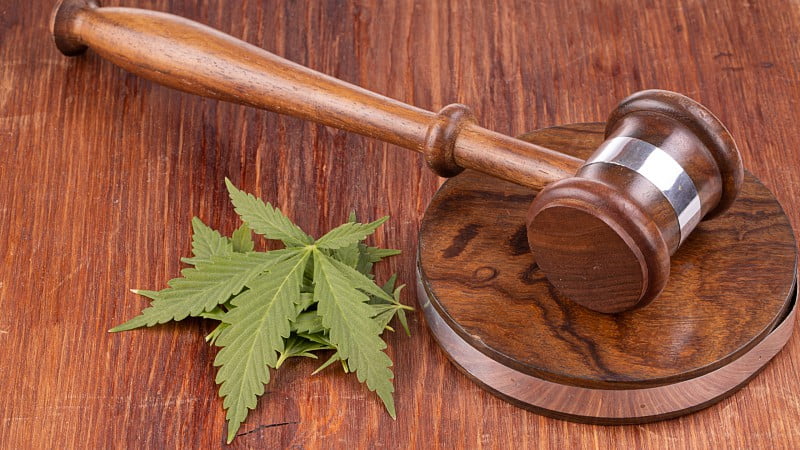CBD vs. THC: What’s the Difference Between the Two?

CBD is just one of over 100 cannabinoids found in cannabis plants. It’s also the second major active compound besides THC.
Consumers are getting more interested in the differences between CBD vs. THC. There’s a large group of users who combine these two molecules to maximize the effects of their cannabis extracts.
CBD and THC have a similar molecular structure to the cannabinoids produced naturally in your body by the endocannabinoid system. (ECS) — hence the wide range of their therapeutic properties.
This guide covers all-important differences between CBD vs. THC, explaining their benefits, uses, safety profile, legal status, and more. We’ll also discuss the mechanisms both cannabinoids use to regulate essential processes in your body.
CBD vs. THC: A Brief Overview
CBD and THC have almost identical chemical makeup. They consist of 30 hydrogen atoms, 21 carbon atoms, and 2 oxygen atoms. That being said, these atoms are arranged differently, which means CBD and THC ultimately have different qualities.
If you’ve never used cannabinoids before, here we explain the basics:
What Is CBD?
CBD is the acronym for cannabidiol, a non-intoxicating cannabinoid synthesized by cannabis plants.
The lack of psychoactive properties means that CBD won’t give you the high associated with marijuana. However, if you take hemp-derived CBD oil, you don’t need to worry about getting high because such products contain 0.3% THC or less.
CBD extracts that meet the THC limit are legal on a federal level, thanks to the 2018 Farm Bill.
CBD has a wide range of therapeutic properties. However, when you hear people talking about CBD, they usually praise it for health and wellness rather than recreational use.
What Is THC?
THC — or delta-9-tetrahydrocannabinol — is the main active ingredient in marijuana plants. It is responsible for the deeply relaxing and euphoric sensations associated with getting high.
It also has analgesic, appetite-stimulating, and sedating properties. While THC isn’t the only cannabinoid capable of inducing intoxication, it’s the only one that occurs in concentrations significant enough to produce a high. That’s why THC has long been associated with recreational use.
Nevertheless, CBD has a lot of documented therapeutic benefits as well. In fact, its cognitive and mood-altering properties can aid patients in an array of physical and mental conditions.
CBD vs. THC: Major Differences

It’s actually difficult to summarize the differences between CBD vs. THC in a nutshell, but here are the most vivid ones:
CBD
- CBD won’t make you feel high in the way THC does because it’s a non-intoxicant.
- CBD has more than 65 molecular targets, but it doesn’t directly bind to cannabinoid receptors in the brain.
- CBD helps the body achieve and maintain higher levels of endocannabinoids in the bloodstream.
- CBD can dampen the high from THC.
- CBD is mostly associated with medical, health, and wellness benefits.
- CBD doesn’t cause toxicity, even in large amounts.
- CBD is safe for animals.
- CBD can be extracted from hemp and marijuana.
- Hemp-derived CBD products are legal on a federal level.
THC
- THC can get you high because it has intoxicating properties.
- People often link THC to recreational cannabis use, although it has many therapeutic benefits too.
- Lower doses of THC can reduce stress and anxiety, but higher doses can aggravate these feelings in sensitive users due to its biphasic nature.
- THC sends signals to the brain by binding to cannabinoid receptors CB1.
- THC can be extracted only from marijuana plants.
- THC is fully legal in Canada and Uruguay. In the USA, 16 states have legalized its recreational use.
CBD vs. THC: How They Work
You can use the above bullet points as a quick reference point, but the differences between CBD vs. THC are more complex than that. When it comes to their use, bot cannabinoids have several recreational and medical benefits.
Let’s focus on the effects of CBD and THC on the brain.
CBD vs. THC: How They Affect the Brain
Most cannabis users consider the high from THC as a pleasurable sensation. They often report a relaxed state of mind, reduced physical tension, bouts of euphoria, giggliness, and even signs of improved cognition.
Low and moderate doses of THC are well-tolerated by humans and can effectively reduce stress and anxiety. But, as we mentioned earlier in the article, high doses of THC can worsen these feelings in sensitive users.
On the other hand, CBD doesn’t get you high, and the range of emotional effects uses a less direct mechanism. CBD can improve your response to daily stressors, making it easier to manage situations that would otherwise drive you nuts.
Even better, CBD can mitigate a strong reaction to THC by binding to the sites of the CB1 receptors to which THC tries to bind. As a result, many people mix marijuana with CBD hemp flower to counterweight the intoxicating effects of THC.
But since both compounds affect your mind in some way — does it mean they’re both psychoactive?
According to the definition of the word “psychoactive,” yes, they are.
Even your laundry machine can be psychoactive if it makes you angry when it glitches.
Your colleagues at work are psychoactive because they make you feel either good or bad around them.
A better way to describe the differences between CBD vs. THC is to use the word “intoxicating” instead of “psychoactive.” Intoxication refers to an altered state of mind, which is exactly what happens when THC enters your body.
CBD doesn’t induce euphoric sensations, so it’s not intoxicating. It is, however, psychoactive because it can help you regulate your mood and improve emotional stability.
CBD vs. THC: How They Affect the Body
CBD products may work better if you’re searching for more of a body-focused experience. They can reduce inflammation, relieve physical discomfort, speed up regeneration processes, and improve your resilience to stress.
The effects of THC, on the other hand, depend on the cannabinoid profile of the product, as well as its terpene content and ratios. Some marijuana strains produce more cerebral effects, while others ensure more of a physical high. You can use both types to moderate or amplify the therapeutic effects of CBD without getting too high from your cannabis.
CBD vs. THC: Health Benefits

THC and CBD interact with different parts of the endocannabinoid system. For example, THC is the stimulant of CB1 and CB2 receptors, while CBD has little effect on both. Instead, CBD exerts its actions by working on multiple receptor-based and receptor-independent pathways throughout the body.
THC and CBD can have complementary effects on each other when it comes to their health benefits. However, they use completely different mechanisms to manifest them.
For example, CBD has remarkable anti-inflammatory properties; it can support the immune system and help consumers alleviate a wide range of ailments. Many health conditions start with chronic inflammation, which would explain why so many people benefit from consistent CBD supplementation.
THC has neuroprotective properties, and its positive effects are mostly attributed to mental health. However, it can also reduce pain, increase appetite, assist people with insomnia, and reduce cancer cells throughout the body.
Physiological vs. Physical Effects of CBD and THC
Both CBD and THC can alter pain transmission to the brain. This, in turn, reduces physical discomfort deriving from inflammation, injuries, migraines, and fibromyalgia.
The difference between CBD vs. THC is that the former offers a relaxing sensation to your body without producing a mellow physical high.
CBD has been mentioned in numerous studies for its ability to reduce anxiety and help individuals manage stress. Moreover, some researchers claim that CBD can also support healthy sleep cycles. In addition, CBD can also protect cells in the brain against oxidative damage and prevent degeneration.
Studies suggest that THC can produce the same neuroprotective effects. Medical researchers have started to investigate these effects concerning Alzheimer’s disease prevention and treatment. The cannabinoid can also improve your focus and elevate your mood if you take it in doses that produce mild intoxication or keep you on the verge of it.
Potential Medical Use of CBD and THC According to Studies
CBD
- Addiction
- Anxiety
- Bacterial growth
- Blood sugar imbalances
- Bone density loss
- Eating disorders
- Inflammation
- Muscle spasms
- Neurodegeneration
- Pain
- Psychosis
- Anxiety
- Chronic stress
- Inflammation
- Insomnia
- Lack of appetite
- Muscle spasticity
- Nausea and vomiting
- Neurodegeneration
- Pain
- PTSD
- Seizures and convulsions
- Tumor growth
THC
- Anxiety
- Chronic stress
- Inflammation
- Insomnia
- Lack of appetite
- Muscle spasticity
- Nausea and vomiting
- Neurodegeneration
- Pain
- PTSD
- Seizures and convulsions
- Tumor growth
CBD vs. THC: Safety and Side Effects
The side effects of CBD are nearly nonexistent when taken in regular doses. Some people experience dry mouth, dizziness, and changes in appetite. On rare occasions, when you ingest too much carrier oil, diarrhea might occur. However, even daily amounts as high as 1500 mg have been well-tolerated by humans (1). That being said, CBD may cause drug interactions by preventing your liver from metabolizing most pharmaceutical medications (2).
The side effects of THC include short-term memory impairment, confusion, dizziness, and mental discomforts such as feelings of anxiety and paranoid thinking patterns. However, THC can also lead to a huge appetite boost; whether you consider this a negative effect or not depends on your relationship with food and overall physical health (3).
Neither CBD nor THC can lead to a lethal overdose because they don’t interact with the brain stem area regulating respiratory functions.
CBD vs. THC: Legal Status

Last but not least, let’s cover the legality of both compounds.
Hemp-derived CBD is legal in all 50 states because it meets the conditions set out by the 2018 Farm Bill. Such products contain 0.3% THC or less, so they won’t get you high.
You can buy hemp-derived CBD products all over the U.S., from pharmacies to specialty stores, vape shops, and wellness centers. A lot of high-quality CBD oils can be found online too. It’s actually better to look for CBD online than somewhere near you because you have more options for researching your potential vendors, such as reading third-party lab reports, user reviews, and expert blogs with the rankings of the best companies.
Long story short, your CBD products are legal as long as they contain 0.3% of THC or less.
The laws around THC and marijuana are harsh in most countries in the world. To date, only Canada and Uruguay have legalized marijuana in the entire spectrum.
The United States has a love-hate history with marijuana. However, since the prohibition in 1937, 16 states have legalized the recreational use of marijuana, and 48 states have some medical marijuana programs for patients. Still, marijuana remains a Schedule I controlled substance according to federal law, making any activity connected with marijuana a felony — including possession of small amounts for personal use.
When shopping for CBD oil online, make sure it comes from hemp unless your country or state allows marijuana for recreational use.
CBD vs. THC: Drug Testing
CBD alone won’t show up on a drug test because these tests are interested only in detecting intoxicating substances, including THC. To be precise, drug tests look for the metabolite of THC known as THC-COOH. The detection threshold for this byproduct has been set at 50 ng/mL, although some tests can yield positive results once the 20 ng threshold has been breached.
But the question is, can you fail a drug test using full-spectrum CBD oil?
No, as long as you have a legitimate product that has been tested for its THC content. Unfortunately, the problem with many CBD oils found online is that they are contaminated with significant THC levels due to the lack of regulation and third-party testing.
If you want to make sure you don’t fail a drug test after taking full-spectrum CBD oil, always look for a Certificate of Analysis that lists the product’s potency, THC content, and results for purity.
Broad-spectrum CBD oils and isolates are a good alternative if you want a THC-free product.
Still, even if you use a lab-tested full-spectrum CBD oil, you shouldn’t get a false-positive result for THC on a drug test unless you take around 1900 mg of CBD daily.
Benefits of Taking CBD and THC Together
By far, you’ve probably noticed that many of the health benefits of CBD and THC overlap despite some obvious differences in their properties. Instead of focusing on “CBD vs. THC,” consider this couple as two synergistic molecules that can mutually enhance their benefits and mitigate some potential unwanted side effects.
Similar to how CBD can dampen the intoxication from THC, some of the effects of CBD are more pronounced when you add a little bit of THC to the mix. This mutual relationship is known as the “entourage effect” or “whole-plant synergy.” Neuroscientists created a concept where all compounds in cannabis — cannabinoids, terpenes, and flavonoids — can only show their full potential when they occur in one extract (4).
That’s why full-spectrum CBD oils are the preferred format instead of broad-spectrum CBD and isolates. Capturing the entire phytochemical profile of the plant allows the manufacturer to maximize the therapeutic value of the end product.
Key Takeaways on the Differences Between CBD vs. THC
To wrap it up, CBD and THC are different yet complementary compounds that can effectively support the functioning of your endocannabinoid system. Instead of looking at them as competitors, try to see the bigger picture. Each of them has unique health benefits, but when used together, they allow you to revel in the full therapeutic potential of cannabis.
If your state doesn’t have a legal marijuana market, you can still enjoy the benefits of full-spectrum CBD oil from hemp. Hemp-derived products are legal in all 50 states as long as they contain less than 0.3% of THC — which isn’t enough to get anyone high but still evokes the entourage effect.
What are your preferences toward CBD and THC? Do you focus on one of them or use both in your routine? Share your thoughts in the comments!
Reference links:
- Iffland, K., & Grotenhermen, F. (2017). An Update on Safety and Side Effects of Cannabidiol: A Review of Clinical Data and Relevant Animal Studies. Cannabis and cannabinoid research, 2(1), 139–154. https://doi.org/10.1089/can.2016.0034
- Brown, J. D., & Winterstein, A. G. (2019). Potential Adverse Drug Events and Drug-Drug Interactions with Medical and Consumer Cannabidiol (CBD) Use. Journal of clinical medicine, 8(7), 989. https://www.ncbi.nlm.nih.gov/pmc/articles/PMC6678684/
- MedlinePlus. (2020). Marijuana Intoxication. Available from: https://medlineplus.gov/ency/article/000952.htm
- Russo E. B. (2011). Taming THC: potential cannabis synergy and phytocannabinoid-terpenoid entourage effects. British journal of pharmacology, 163(7), 1344–1364. https://doi.org/10.1111/j.1476-5381.2011.01238.x